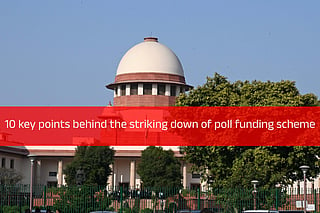
A 5-judge Supreme Court bench headed by Chief Justice of India (CJI) D Y Chandrachud delivered its verdict on a set of petitions challenging the legal legitimacy of the electoral bonds scheme implemented by the Central government. This scheme permits undisclosed funding to political parties.
CJI Chandrachud, in the initial remarks of the judgment, highlighted that there were two perspectives—his own and that of Justice Sanjiv Khanna—yet both led to a unanimous conclusion.
A constitution bench comprised of five judges had reserved its verdict on the matter last November.
Calling the electoral bonds scheme 'unconstitutional', a five-judge Constitution bench headed by Chief Justice of India (CJI) DY Chandrachud issued a directive, instructing issuing banks to immediately cease the sale of electoral bonds.
Chief Justice Chandrachud, while delivering the verdict, stated that the electoral bonds scheme violates the Right to Information (RTI) Act and the freedom of speech and expression guaranteed under Article 19(1)(a) of the Constitution.
The Supreme Court also ordered the State Bank of India (SBI) to reveal to the Election Commission the names of contributors and the currency denomination to the six-year-old electoral bonds scheme.
Furthermore, the SBI is now mandated to submit details of electoral bonds purchased from April 12, 2019 up till now to the Election Commission of India by March 6. The ECI then has to publish the information on its website by March 13, 2024.
The Supreme Court emphasized that compromising the Right to Information is not justified as a means to combat black money and that there were other alternatives.
It also directed political parties to return all electoral bonds which are within the 15-day validity period but which have not yet been encashed, to the purchasers.
The apex court bench underscored that the fundamental right to privacy encompasses citizens' entitlement to political privacy and affiliation. But it cannot be allowed to stand in the way of the citizen's right to know who's behind a political party and his right to transparency in elections.
Additionally, the bench invalidated amendments made in various laws, including the Representation of Peoples Act and the Income Tax laws.
The Supreme Court emphasized the necessity of disclosing information about corporate contributors through electoral bonds, highlighting that donations by companies are purely for quid pro quo (a favour) purposes.
The top court also declared that amendments in the Companies Act, allowing unlimited political contributions by companies, are arbitrary and unconstitutional.
The electoral bonds scheme, introduced by the government on January 2, 2018, was presented as an alternative to cash donations made to political parties, with the aim of enhancing transparency in political funding.
An individual can buy electoral bonds, either singly or jointly with other individuals.
(With inputs from Agencies)